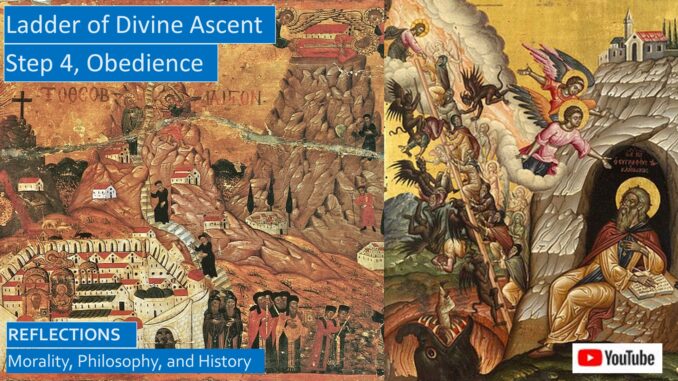
What can we learn as we reflect on climbing the fourth rung of Obedience of the Ladder of Divine Ascent by St John Climacus?
Why is obedience considered to be foundational to the Christian life by monastics and many devout Christians?
Should laymen obey the spiritual advice of their confessors?
How can laymen apply this advice St John Climacus offers to his fellow monks?
Script for this video, with more Amazon book links: https://www.slideshare.net/BruceStrom1/st-john-climacus-ladder-of-divine-ascent-on-obedience-step-4
YouTube link: https://youtu.be/_bjQcNvzb-c
For more interesting videos, please click to subscribe to our YouTube Channel:
https://www.youtube.com/@ReflectionsMPH/?sub_confirmation=1
PRECEDING RUNGS ON THE LADDER OF DIVINE ASCENT
St John Climacus wrote the Ladder of Divine Ascent as a handbook for monks living the monastic life, cut off from the world, in the isolation of the Egyptian desert monasteries, in a world before global communications where the monk could easily call his family on the monastery phone. In the first chapter he has some advice for the layman who wishes to live the perfect life as best he can in the world, but the advice for his fellow monks must be allegorized to apply it to our lives as laymen.
Introduction and first rung of Ladder of Divine Ascent: https://youtu.be/Fco0W3bt5GA
The fourth step of the Ladder of Divine Ascent is On Blessed and Ever-Memorable Obedience, which St John Climacus views as a spiritual battle fought by “warriors and athletes of Christ. As the flower precedes the fruit, so Exile and Pilgrimage, either of the body or will, always precedes Obedience,” and this was preceded by Detachment from the world.
Prior rungs on detachment from the world, and exile and pilgrimage from the world: https://youtu.be/qDtrgYmaAQU
Should we be blindly obedient? St John Climacus warns his monks that they should carefully choose their abbot:
Step 4.6. St John Climacus teaches us: “When motives of humility and real longing for salvation incite us to bend our neck and entrust ourselves to another in the Lord, before entering upon this life, if there is any cleverness and prudence in us, we ought first to question and examine, and even, so to speak, test our helmsman, so as not to mistake the sailor for the pilot, a sick man for the doctor, a passionate for a dispassionate man, the sea for a harbor, and so bring about the speedy shipwreck of our soul.” St John Climacus makes it clear we should choose our spiritual advisor with care, to choose those whom we will obey in trust with care.
How does this advice apply to us in our lives as laymen? When choosing a pastor or priest, we should pick him whose spiritual advice we value, and if he is a priest to whom we will confess, if he gives us advice we don’t want to hear, we should be very reluctant not to follow it. And when it is time to marry, we should be careful whom we choose to be our spouse. And the women should ask, not only will this man be a good husband? But more important, will he be a good father?
Note: Paragraphs in italics were not included in the YouTube video, they will appear in future videos and blogs.
Just as the monk should be careful in choosing an abbot to whom he will submit, so we should take care who we marry! Indeed, bad marriages have drug many a good soul off the ladder hurtling down into the abyss of bitterness and hatred. So, what if we were not so wise in our initial selection, and we now are suffering the consequences? Does this advice apply to us any less? No, the advice is the same, what is different is it is far more difficult, if not impossible, to follow if we did not choose our spouse with care.
More importantly, we should attend confession and obey our confessor, even when we think he is wrong. If both you and your spouse confess to the same confessor, which is advisable, and your marriage is in trouble, it is doubly important that you obey what he demands of you. In such a case the consequences of disobedience if your confessor is right is far more severe than the consequences of obedience if your confessor is wrong, because he is never wrong even when he is.
Step 4.6. St John Climacus continues: “But when once we have entered the arena of piety and obedience, we must no longer judge our good manager in any way at all, even though we may perhaps see in him some slight failings, since he is only human. Otherwise, by sitting in judgment we shall get no profit from our subjection.”
We don’t mind carrying our Cross as Christ bids us as long as we really have no idea exactly what that means. But not being judgmental on the faults of our spouse, and subjecting ourselves to their will even when they might be wrong, or when we know they are wrong, that can be very tough and even impossible. But to imply that we will profit by subjecting ourselves to someone who can be very difficult to get along with, that is tough.
Many women have trouble with St Paul’s admonition in Ephesians that women should submit to their husbands, without waiting to hear his next advice, that husbands and wives should submit themselves to each other, a verse equally offensive to both husbands and wives. Why many women despise this verse is they cannot bear to submit to a man who drinks and loafs and cheats. Why blame God for your mistake? Implicit in this is a command to the husband that he live a godly life worth emulating.
Father Vassilios teaches us that in the “mystery and sacrament of marriage, husband and wife are a paradigm of the intimate union between Christ, the Bridegroom, and his Bride, the Church. Thus, husband and wife are invited to attain perfect love and self-denial though marital union in the name of Christ. This means that marriage, no less than monasticism, is a calling to union with God.” “No marriage can work if both spouses do not sacrifice their own wills in loving obedience” to each other.
Likewise, implicit in the command to honor your parents is your parents should live a godly life, so they are worthy of the honor of their children. If you do not live a godly life your children cannot honor you, the best they can do is to remember what good in you they can remember.
We cannot choose our parents, but we do indeed choose our spouse. I knew a mom who was so frustrated because her husband loafed about the house during the week and played in a band on the weekend. I asked her where she met him. She was one of his groupies when he played in his band on the weekends! Another story I hear over and over is wives whose husbands drink. Where did they meet? In a nightclub, of course.
Some of this discussion is from my experiences being a facilitator in a Divorce Care ministry, and though many Catholic parishes participate in this ministry, there is also a similar ministry that is geared specifically towards Catholics.
https://www.divorcecare.org/ and https://www.catholicsdivorce.com/
St John of the Cross in the Dark Night of the Soul commented that we should only pick friends who deepen our Love for God. This is doubly true for those whom we marry.
St John of the Cross and best friends: https://youtu.be/DgL7Y5pIFAU
A short time later St Paul also admonishes slaves that they should submit to their masters, a verse most commentators teach is equally applicable to employees. Note that St Paul does not say husbands and wives should submit themselves to each other only when the other is right, but that they should submit to one another. This does not infer that you are obligated to submit even when that causes you to sin, what it does say is when you submit you are not being critical of your spouse, you are seeing them in the best light possible, thinking the best rather than the worst of them, giving them the shadow of the doubt.
Gentle reader, do you still doubt that the obedience St John Climacus orders for his monks also applies to the obedience of husband to wife, and wife to husband? If so, let us read on to his next paragraph:
Step 4.7. “It is absolutely indispensable for those of us who wish to retain undoubting faith in our superiors to write their good deeds indelibly in our hearts and constantly remember them, so that when the demons sow among us lack of faith in them, we may be able to silence them by what is preserved in our memory.”
To get along in life, we always need to remember the Before Five and the After Five rules. Before five, the boss is always right, and after five, the wife is always right. Also, remember the good deeds, remember the kind words, remember the good times; seek to forget those times our spouses wronged us, hurt us, or slighted us. If we see the good in the people in our lives, if we think the best of them, we bring out the best in them.
Step 4.7 St John Climacus continues: “But he who stumbled on distrust has already fallen; for all that does not spring from faith is sin. The moment any thought of judging or condemning your superior occurs to you, leap away from it as from fornication. Whatever you do, give that snake no license, no place, no entry, no power; but say to that serpent: ‘Listen, deceiver, I have no authority to judge my superior, but he has been appointed to sit in judgment on me. It is not I who am to be his judge, but he is deputed to be mine.’”
When applying this to marriage, neither the husband nor the wife is the master, and both are the master. This is key for marriage, to not judge our spouse. Say something good or say nothing at all.
The writing of John Climacus cannot be stronger. Those whose marriages are troubled may say these words do not apply to them; that these words are for monks obeying abbots, teenagers obeying parents, laborers obeying their bosses. But in a troubled marriage, who is to say who is right and who is wrong? How can one tell? Quarreling was tried and does not work, no matter who is right and who is wrong, so why not try obedience, no matter who is right and who is wrong? Force yourself to live for the other for a time, maybe for a few weeks or months, thinking nothing of what you want or need, trying to please and serve your spouse. This is truly radical advice, but then Jesus was a truly radical kind of fellow.
However, one practical bit of advice for ladies in difficult marriages is that if either you or your kids are being physically abused, you must separate and go to a safe place. Jesus not only wants you to be safe, but you must also feel safe to be truly free to live a godly life, you cannot live a godly life in fear.
Obedience precedes repentance in the Ladder of Divine Ascent. Without obedience, there is no repentance. With repentance comes obedience. When we sinned, we did not obey; now we repent, and obey. It is interesting that in the Decalogue the commandment of honor our father and our mother, and all those in authority, connects the commands to Love God with all our heart and with all of our soul and with all of our everything to the commands to love our neighbor as ourselves.
Step 4.3 As John Climacus teaches us, in obedience we renounce our desires, what we want, what we need: “Obedience is unquestioning movement, voluntary death, a life free of curiosity, carefree danger, unprepared defense before God, fearlessness of death, a safe voyage, a sleeper’s progress. Obedience is the tomb of the will and the resurrection of humility.”
These contradictory pairing of opposites, like carefree danger, a sleeper’s progress, reveal that our perception of life on earth is often opposite to the eternal truth, that what we see a progress is going back, and what the world sees as restricting is actually liberating, which is true for obedience.
Father Vassilios views “obedience as the first fundamental virtue of the ladder.” “Why is obedience a virtue? Many regard it as something for the weak.” The virtue of obedience is rooted in humility, “obedience and humility go hand in hand, they feed and nourish one another. We cannot learn obedience without humility, and we cannot acquire humility without obedience. Together, these two virtues can take us to the very heights of spiritual perfection.”
John Climacus ends this paragraph with a statement we need to ponder to understand:
Step 4.3. “Obedience is an abandonment of discernment in a wealth of discernment.”
To put it another way, obedience is not blind, obedience is the seeing being blind, choosing to be blind in our eyes so we can see the world through our brother’s eyes, or our spouse’s eyes. By acting simply and obediently we show far more wisdom than we would in our most clever imagined argument. Arguments are fought, never heard.
How is such radical obedience possible? It is far more possible where there is true love, as John Climacus relates:
Step 4.14. “In this flock, they were united by the indissoluble bond of love; and what was still more wonderful, it was free from all familiarity and idle talk. More than anything else, they tried not to wound a brother’s conscience in any way.”
How can we tell if there is still love in a troubled marriage? To find out, ask, how is he with your children? Does he want to spend time with them? Do they look forward to their time with dad? Does he work? Does he drink? Is he faithful? If he is good with your children, what fault can you not forgive; what shortcoming can you not overlook?
There are many thoughts on obedience in this the longest chapter in the book. Again, St John Climacus bids us not to find fault with our guide. Likewise, we should not strive to find fault with our spouse, our employer, or anyone else whom we serve. Rather, we should focus on their virtues:
Step 4.98. St John Climacus teaches us, “The Lord who makes wise the blind opens the eyes of the obedient to the virtues of their guide, and He blinds them to his defects. But the hater of good does the opposite.”
St John Climacus urges us not only to be blind to our neighbor’s defects, seeing his virtues, but he also bids us to mourn for our neighbor’s sins, and rejoice in his virtues:
Step 4.47. “A man will know his brotherly love and his genuine charity when he sees that he mourns for his brother’s sins, and rejoices at his progress and gifts.”
All too often in marriage you are tempted to stray when your spouse neglects you or ignores you or is downright callous towards you. When this happens, should we seek the arms of another, or be ever more understanding and compassionate to those whose lives intertwines ours? This next saying of John Climacus is most interesting:
Step 4.85. St John Climacus teaches us: “Eagerly drink scorn and insult as the water of life from everyone who wants to give you this drink that cleanses from lust. Then a deep purity will dawn in your soul and the light of God will not grow dim in your heart.”
If you are friends only to those who always immediately show their appreciation and gratitude for our every kindness, what sort of friend are we? If we expect immediately to get each time we give, are we truly acting as a friend? Should our friendship be like the waves in the sea, pushing to shore only to pull back out to see? Or should our friendship be like a fast-flowing river, flowing out to the sea?
When others scorn and insult us, how can know it is truly us whom they intend to scorn and insult? Or are we collateral damage? We are all prisoners of our past, unable to break through the bars, unless those around us return kindness for cruelty, affection for scowls, smiles for scorn. Witness the stray dog who cowers at a moving hand, who only wags his tail after someone is kind to him for many months and maybe years. When someone is scornful towards us, maybe we remind them of someone close to them who was cruel to them many years ago.
We must be patient, as St John Climacus urges us:
Step 4.44. “Blessed is he who, though maligned and disparaged every day for the Lord’s sake, constrains himself to be patient.” “Blessed is the monk who regards himself as hourly deserving every dishonor and disparagement.” “Blessed is he who mortifies his will to the end.”
St John Climacus observes that repentance flows from obedience:
Step 4.44. “He who will not accept a reproof, just or unjust, renounces his own salvation. But he who accepts it with an effort, or even without an effort, will soon receive the remission of his sins.”
Confession is a defense against sin:
Step 4.53. “By resolving to make one’s confession, the soul is thereby held from sinning as by a bridle.”
Others should not be blamed for our sins:
Step 4.62. “It is often the habit of the demons to persuade us either not to confess, or to do so as if we were confessing another person’s sins, or to lay the blame for our sin on others.”
Obedience is everyday humility, everyday forbearing, everyday repentance. Obedience is spiritual exercise, and with this discipline comes discernment:
Step 4.105. “From obedience comes humility.” “From humility comes discernment.” “From discernment comes clairvoyance, and from clairvoyance comes foreknowledge.”
You cannot take a holiday or a vacation from striving to lead a godly life.
Step 4.93. “He who has secretly vowed not to retire from the struggle till his last breath, and to endure a thousand deaths of body and soul, will not easily fall into any of these defects.”
In Dostoyevsky’s novel “The Brothers Karamazov” there is a story about a fifth century novice who disobeyed the instructions of the elder and left the monastery. An elder is someone who guides your spiritual well-being whom you are supposed to obey unconditionally. Eventually he traveled to a distant land, where he was martyred for the sake of his faith. But when they tried to place his casket in the ground it kept moving away. Only when the elder gave his release for his disobedience could he able to be buried as a martyr.
In summary, Father Mack teaches us: “Obedience is necessary to cut off our self-will and pride. To obey is to learn not to judge. To obey is to practice patience.” “Our obedience does not earn us anything. Rather, obedience changes us, readying us to receive the Love with God has already given to mankind in Christ.”
Above all, we should follow the advice of St John Climacus, being forever cheerfully obedient, each day, everyday, all the days of our lives, in his closing sentence:
Step 4.126. “Athlete, keep running fearlessly!”
Ahead is the fifth rung, the persistence of repentance, which we compare to the unrelenting campaign against Hitler, where the Allies demanded unconditional surrender from the forces of evil. There will be two videos before the rungs of the ladder where we will confront the sins and spiritual dangers of slander, talkativeness, and lying.
Rung of repentance: https://youtu.be/NiuWNsy4x4Q
Rung fleeing from slander: https://youtu.be/SLBIdDHRy3A
When reflecting on the teachings of St John Climacus on obedience and repentance, modern readers are often repulsed by the extreme humilities visited on the monks by the abbots, disciplines which would be seen as abuse according to today’s standards. We have the novitiate who prostrates himself before the abbot, who ignores him for several hours, testing to see if he would fall asleep. No, the monk was reciting the psalter from memory.
We have many fantastic stories in this chapter on obedience. We have the fantastic story of Brother Isidore, whom the abbot found was “full of mischief, very cruel, sly, fierce and arrogant.” The abbot told him before he joined the monastery, he needed to learn the discipline of obedience. The abbot instructed Isidore:
Step 4.23 “Stand at the gate of the monastery and make a prostration to everyone coming in or going out, and say, ‘Pray for me father, for I am an epileptic.’”
After humbling himself for seven years, the abbot relented, offering to admit him to the brotherhood. But he declined, sensing that his end was near, and in ten days died on his deathbed.[1]
[1] St John Climacus, Ladder of Divine Ascent (Boston: Holy Transfiguration Monastery, 1991, originally written 1100’s, translated by Colm Luibheid and Norman Russell), Step 4, pp. 20-54; and Father John Mack, Ascending the Heights, Laymen’s Guide to the Ladder of Divine Ascent (Ben Lamond, California: Conciliar Press, 1999), Step 4, pp. 25-26; and Father Vassilios Papavassiliou, Thirty Steps to Heaven, The Ladder of Divine Ascent for All Walks of Life (Chesterton, Indiana: Ancient Faith Publishing, 2103), Step 4, pp. 35-39.

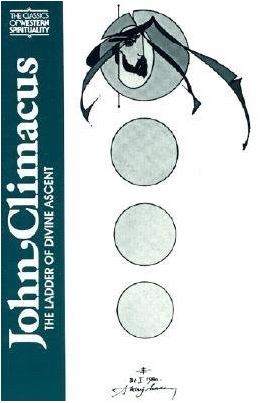
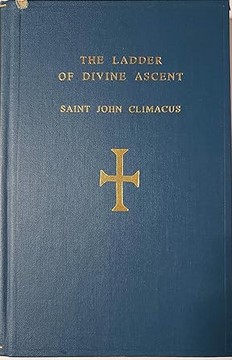
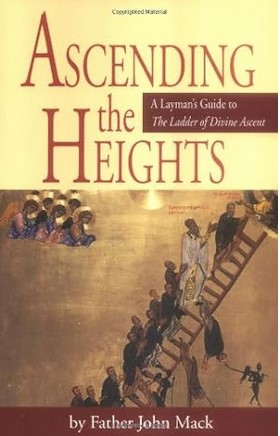
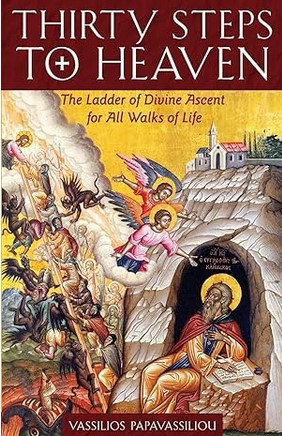
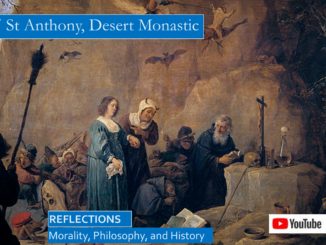
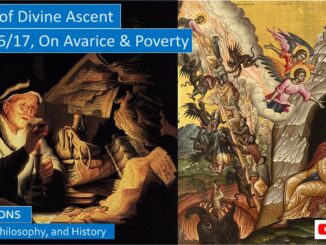
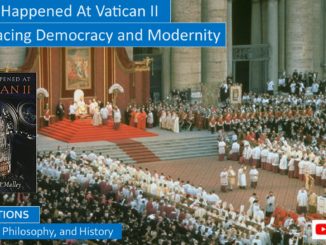
2 Trackbacks / Pingbacks